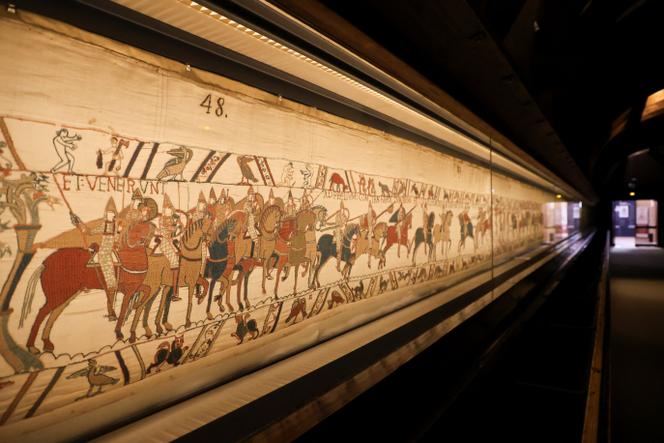


The 11th-century Bayeux Tapestry has been moved from its museum in northern France for the first time in more than 40 years, authorities said on Friday, September 19, before the artwork's loan to the United Kingdom. The 68-meter-long (224-foot-long) tapestry, which depicts the Norman conquest of England in 1066, was taken to a secret storage location from its museum in the French town of Bayeux in Normandy, sources told AFP.
The authorities in Calvados, northern France, which supervised the delicate maneuver with Normandy's regional cultural affairs body (DRAC), said more than 90 people were involved in the removal, which took seven hours and 15 minutes.
"The tapestry, packed in a crate, reached its storage location" late on Friday afternoon, the prefecture said in a statement, without providing further details about where it was being kept.
The operation had been planned for Thursday, prompting the French government to announce a delay as a result of nationwide strikes and protests against French President Emmanuel Macron. But because of the intricate planning involved, the removal – the first from the museum since 1983 – went ahead as planned under a shroud of secrecy, the sources with knowledge of the move said.
"The conditions and timing of the operation were kept secret to organize the transfer under optimal security conditions for the artwork and with minimal impact on the residents of Bayeux," the Calvados prefecture added.
France's loan of the artifact, which was added to UNESCO's "Memory of the World" register in 2007, has sparked an outcry from heritage experts concerned over the ancient embroidery's already fragile state.
Since 2020, experts have meticulously documented 24,204 stains, 9,646 holes and 30 tears in the artwork. In 2021, DRAC told AFP that "it was not possible to transport the work before restoring it."
In July, Macron promised to loan the tapestry to the British Museum in London in September 2026 for 18 months to celebrate the relationship between France and Britain, with the tapestry set to land on British soil for the first time.
Critics argue that the transfer to the UK risks causing damage to the priceless piece. More than 73,000 people have signed an online petition on change.org urging Macron to stop a "true heritage crime."
